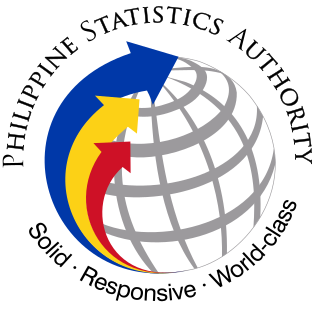
The Philippine Statistics Authority, abbreviated as PSA, is the central statistical authority of the Philippine government that collects, compiles, analyzes and publishes statistical information on economic, social, demographic, political affairs and general affairs of the people of the Philippines and enforces the civil registration functions in the country.

The Philippine Atmospheric, Geophysical and Astronomical Services Administration is the National Meteorological and Hydrological Services (NMHS) agency of the Philippines mandated to provide protection against natural calamities and to insure the safety, well-being and economic security of all the people, and for the promotion of national progress by undertaking scientific and technological services in meteorology, hydrology, climatology, astronomy and other geophysical sciences. Created on December 8, 1972, by reorganizing the Weather Bureau, PAGASA now serves as one of the Scientific and Technological Services Institutes of the Department of Science and Technology.
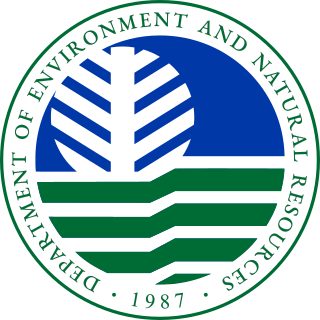
The Department of Environment and Natural Resources is the executive department of the Philippine government responsible for governing and supervising the exploration, development, utilization, and conservation of the country's natural resources.
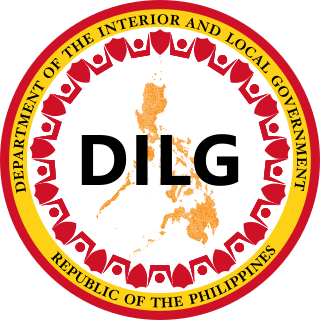
The Department of the Interior and Local Government, abbreviated as DILG, is the executive department of the Philippine government responsible for promoting peace and order, ensuring public safety and strengthening local government capability aimed towards the effective delivery of basic services to the citizenry.

The Department of Trade and Industry is the executive department of the Philippine government tasked as the main economic catalyst that enables innovative, competitive, job generating, inclusive business, and empowers consumers. It acts as a catalyst for intensified private sector activity in order to accelerate and sustain economic growth through comprehensive industrial growth strategy, progressive and socially responsible trade liberalization and deregulation programs and policymaking designed for the expansion and diversification of Philippine trade – both domestic and foreign.

Philippine Rice Research Institute (PhilRice) is a government corporate entity attached to the Department of Agriculture created through Executive Order 1061 on 5 November 1985 to help develop high-yielding and cost-reducing technologies for farmers.

The Department of Agriculture is the executive department of the Philippine government responsible for the promotion of agricultural and fisheries development and growth. It has its headquarters at Elliptical Road corner Visayas Avenue, Diliman, Quezon City.
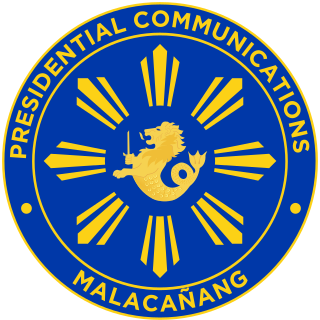
The Presidential Communications Group, or simply the Communications Group, is the collective name for the offices within the Office of the President of the Philippines and refers to the following positions and offices: the Presidential Spokesperson and the Presidential Communications Operations Office (PCOO)—formerly known the Office of the Press Secretary.

The Philippines' Agricultural Training Institute, is an agency of the Philippine government under the Department of Agriculture responsible for training agricultural extension workers and their clientele; conducting multi-level training programs to promote and accelerate rural development; and ensuring that research results are communicated to the farmers through appropriate training and extension activities.
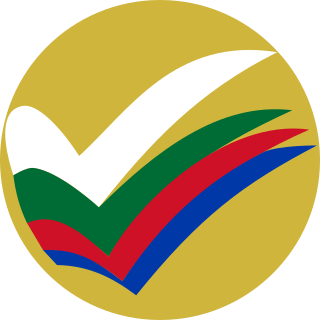
The Philippines' Bureau of Agriculture and Fisheries Product Standards, is an agency of the Philippine government under the Department of Agriculture responsible for setting and implementing standards for fresh primary and secondary processed agricultural and fishery products.

The Philippines' Bureau of Fisheries and Aquatic Resources, is an agency of the Philippine government under the Department of Agriculture responsible for the development, improvement, law enforcement, management and conservation of the Philippines' fisheries and aquatic resources.

The Philippines' Bureau of Plant Industry, is an agency of the Philippine government under the Department of Agriculture responsible for serving and supporting the Philippine plant industry sector.
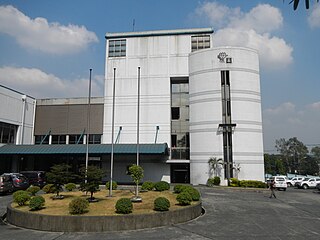
The Philippines' Bureau of Soils and Water Management, is an agency of the Philippine government under the Department of Agriculture responsible for advising and rendering assistance on matters relative to the utilization of soils and water as vital agricultural resources.

The Philippine Coconut Authority is an agency of the Philippine government under the Department of Agriculture responsible for developing the coconut and other palm oil industry to its full potential in line with the new vision of a united, globally competitive and efficient industry.

The Technical Education and Skills Development Authority serves as the Philippines' Technical Vocational Education and Training (TVET) authority. As a government agency, TESDA is tasked to both manage and supervise the Philippines' Technical Education and Skills Development (TESD). Its goals are to develop the Filipino workforce with "world-class competence and positive work values" and to provide quality technical-educational and skills development through its direction, policies, and programs.
The Bureau of Postharvest Research and Extension (BPRE), formerly known as the National Postharvest Institute for Research and Extension (NAPHIRE), is a bureau of the Department of Agriculture of the Philippines.

Science and technology in the Philippines describes scientific and technological progress made by the Philippines and analyses related policy issues. The main agency responsible for managing science and technology (S&T) is the Department of Science and Technology (DOST). There are also sectoral councils for Forestry, Agriculture and Aquaculture, the Metal Industry, Nuclear Research, Food and Nutrition, Health, Meteorology, Volcanology and Seismology.

The National Commission on Muslim Filipinos is a government agency in the Philippines, whose objective is to promote the rights of Muslim Filipinos and to make them active participants in Philippine nation-building.

The Office of the President of the Philippines, is an administrative, advisory, consultative government agency which aids the president of the Philippines in performing their duty as head of state and chief of the executive branch of government.
The Agriculture and Fisheries Modernization Act of 1997 (AFMA), officially designated as Republic Act No. 8435, is a comprehensive legislation that provides blueprint for the sector’s modernization and rural development in the Philippines.


















